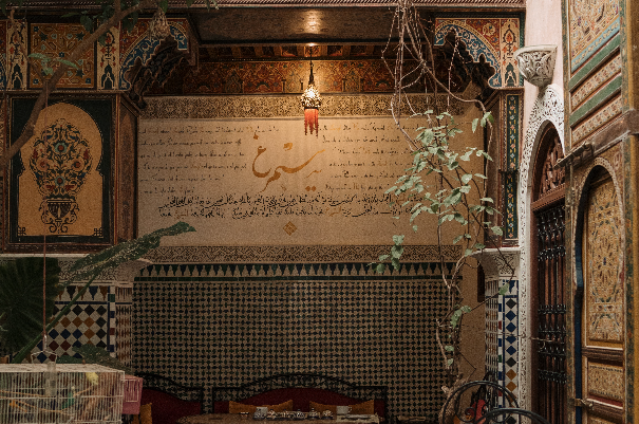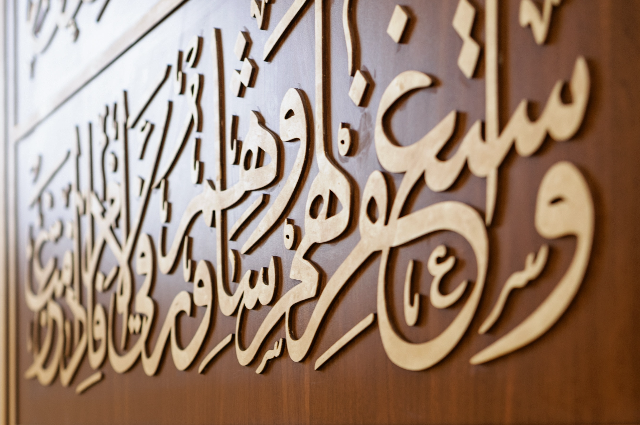Introduction
The Arabic word tasawwuf, generally translated as Sufism, is commonly defined as Islamic mysticism (Huda). Sufism, mystical movement within Islam that seeks to find divine love and knowledge through direct personal experience of God. It consists of a variety of mystical paths that are designed to ascertain the nature of mankind and God and to facilitate the experience of divine love and wisdom in the world. Though Sufi practitioners have often been at odds with the mainstream of Islamic theology and law, the importance of Sufism in the history of Islam is incalculable, especially the sufi literature, for example, the sufi writings of caliph al-Nasir's personal advisor 'Abū Hafs 'Umar al-Suhrawardi are important in understanding the ideological side to al-Nasir's policies. The Sufi movement consists of fraternal orders in which leaders train and assist disciples in the mastery of Sufism's philosophical principles and ritual practices. Such rituals and practices include writing and reciting poetry and hymns; some of the most famous and beautiful literature of the Islamic world has been written by Sufis. In Indian subcontinent, Sufism helped the assimilation of the Afghani Delhi Sultanate rulers within mainstream society. By building a syncretic medieval culture tolerant and appreciative of non-Muslims, Sufi saints contributed to a growth of stability, vernacular literature, and devotional music. One Sufi mystic, Saiyid Muhammad Ghaus Gwaliori popularized yogic practices among Sufi circles. Literature related to monotheism and the Bhakti movement also formed syncretic influences in history during the Sultanate period.

Sufi Literature
Sufi literature originated in the 9th century C.E. Eventually, as the practices and dogma of Sufism developed to incorporate methods of training and disciplining of the soul, thematic works gave way to more elaborate treatises on the
"Science of the Hidden" or "' ilm al – batin’.
Sufi literature had more academic concerns besides just the jurisprudential and theological works seen in madrasa. There were three major categories of mystical works studied in South Asia: hagiographical writing, discourses of the teacher, and letters of the master. Sufis also studied various other manuals describing code of conduct,adab (Islam).
In fact, the text (trans.) "Path of God's Bondsmen from Origin to Return" written by a Persian Sufi saint, Najm al-Din Razi, spread throughout India during the authors' lifetime. Sharing that Sufi thought was becoming increasingly favorable to study in India. Even today, preserved mystical literature has proved invaluable as a source of religious and social history of Sufi Muslims in India. Especially in the model of poetry.

Poetry has always been present as a rich tradition among all Indian religions. As an influential medium to disperse ideas, poetry has appealed to people for generations. The audience in India was already familiar with hymns in local languages. Thus Sufi devotional singing was instantly successful among the populations. Many Sufi traditions encouraged poetry and music as part of education. Sufism spread widely with their teachings packaged in popular songs accessing mass demographics Sufi gatherings today are known as qawwali. One of the biggest contributors to the musical Sufi tradition was Amir Khusro (d. 1325). Known as a disciple of Nizamuddin Chishti, Amir was known as the most talented musical poet in the early Muslim period of India. He is considered the founder of Indo-Muslim devotional music traditions. Nicknamed "Parrot of India," Amir Khusro furthered the Chishti affiliation through this rising Sufi culture within India.
Iccha masthan
Icha Abdul Khader Mastan (1871 - 1933), well known as Icha Mastan, was a twentieth century Sufi saint, spiritual poet and philosopher who lived in northern Kerala. For his brilliant writing style, which blends wisdom, personal thoughts and romantic thoughts in a unique way he has earned the nickname 'Umar Khayyam of kerala'. Many of his compositions, including many poems and songs, are still popular as Mappilappattu. He was born in 1871 in the Veluthakandi family near the Kannur City Juma Masjid in the Malabar District of British India. His family traditionally sold copper pot lamps. After his primary studies, he became involved in the traditional trade of his family. It was during his business travels that iccha masthan became acquainted with Sufism and entered the spiritual realm (Abu).
Abdul Qadir's biography reveals the mysterious turning points in the biographies of additional Sufi saints. During the trade, Abdul Qadir receives a few copper plates inscribed in Arabic and Chentamizhi. Abdul Qadir, fascinated by Ola's alphabet, kept it in his hand without lighting it and went in search of those who could read it during his business trip. After a long wait, he met with a Sufi, explained to him the fragments of Allafal Alif's poetry inscribed on the Sufi saint'scopper plates, and persuaded Abdul Qadir to visit the grave Mandapam of Shaykh Umar al - Qahiri's poet in the backwaters.. Qadiri's disciples were waiting for Abdul Qadir there. They embraced Khader by calling him 'Icha', which means divine decision, and welcomed him to spiritual discipline.. Through his Sufi masters, he gained a greater understanding of the Qur'an, jurisprudence, and hadith, and then quickly adopted Qadiriyya from Sufi saints, including Sheikh Mohammed Moula Bukhari, and began to conquer the spiritual ladder. During this period he was proficient in eight languages including Tamil, Chentamil, Arabic, Persian, Urdu and Sanskrit 6.
Writings
It was during this period that Icha Mastan's literary prowess exploded. Thoughtful lyrics in Malayalam, Tamil, Chentamil, Arabic, Persian, Urdu and Sanskrit have been released. Poetic sculptures were born. While natural poetry on the subject of flowers, trees, and birds came to be known as "poopecchalukal,"

the latter became " viruthangal" that later had to go to Arabic and Persian enlightenment texts or Sufi masters to understand philosophical levels. It is estimated that Icha composed about twelve thousand versions of the Sufi language. It is noteworthy that Icha Mastan's ten anthologies were featured in the Indian Anti - Quarterly published by the British Government of India
Features of His Writing
1.Vernacularization
Vernacular language is indigenous, native or local, spoken either by a rural or urban speech community, or by a lower social class; it is informal, or casual, or the least standardized; it is contrastively used with standard language. The notion of "vernacular Islam" does not deny the consistencies or universalist orientations in many Muslim beliefs and practices (Anjum). Iccha uses many kinds of vernacular words to his works which make more different from any other literary works.
2. Ambiguity
Generally Poets often utilize elements of ambiguity in order that their poems can be made precise, for example–precise in the sense that various ideas, associations and situations are created simultaneously by one single word or expression or sentence, and thus making the poem appear to be almost always full of life.
Ambiguity in his literature serves the purpose of lending a deeper meaning to a literary work. By introducing ambiguity in works, give liberty to readers to use their imagination to explore meanings.as the divinity could not able to attain in the same way. This active participation of the readers involves them poetry they read. Ambiguous situations often have an element of uncertainty.
3. Mystical oneness
The concepts of unity and oneness of mankind also appear in his works. For example, the poem "Who Am I?" implies that human beings are all creatures of God regardless of what religion or land they belong to. So as to contemplate beyond physical being, God has privileged mankind by blessing him with the soul, which helps him understand the concepts of love, affection, sacrifice, etc. Hence, the human soul is placeless and traceless. It exists somewhere beyond the mundane world, so the body carrying the soul should also nurture it in a way that brings it closer to the ultimate Beloved. This may be achieved if all human beings consider themselves as members of an organic whole
In one of his poem Iccha uses the word shiva- the supreme god of hindus- not in the meaning of multitheism, but in the view of ultimate power.
Influence in the Social Premises
Due to his literary works, the society began reading his works and research over the meanings of everlasting sufi notion. The lines of Iccha masthan was celebrated among the society. It shattered very nice light to the youth to make study on the mysticism. Thus it made a progress in the development of social practices as well as pluralistic beauty.
The period of Iccha is also very important to the context of his poems. It was the period in which the society was involved in different forms of untouchabilities. Here in this case he announce people about the god, in front of all are equal.
Conclusion
The above discussion demonstrates Sufi scholarship in the lights of local perspective. Sufis not only admired the Hindu mystics and their exercises but they also adopted some of their techniques and translated their texts on yoga and taught these texts to their disciples. Iccha masthan’s ‘viruthangal’ is a form of Sufi scholarship that has contributed to the process of indigenization of Islam and the making of keralite Muslim identity in the sufi literature world. The long lasting acquaintance of the world with his works is the evidence of perfect and acceptance.
. . .
REFERENCES:
- Qamar-ul Huda (2003), Striving for Divine Union: Spiritual Exercises for Suhraward Sufis, RoutledgeCurzon, pp. 1–4, ISBN 9781135788438
- SUFISM- The Message of Love and Compassion leading to Truth-Project Report, Mohit Bhardwaj, Ajmer, 2015.
- O. Abu, Icchayude Viruthangal, Amina bookstall, Thrissur, 1997, pp.10-13.
- Anjum, Tanwir - Vernacularization of Islam and Sufism in South Asia: A Study of the Production of Sufi Literature in Local Languages, Journal of the Research Society of Pakistan, Vol. 54, No. 1, January-June, 2017, pp. 209-210.
- Green, Nile- Sufism: A Global History, Wiley-Blackwell, February 2012, pp- 144, ISBN: 978-1-405-15765-0.
- Azra, Azyumardi, The Origins of Islamic Reformism in Southeast Asia: Networks of Malay-Indonesian and Middle Eastern ‘Ulama>’ in the Seventeenth and Eighteenth Centuries, Honolulu: ASAA-Allen & Unwin and University of Hawai’i Press, 2004, pp.84-85.
- Rohmana, Jajang A.- Al-Jami‘ah, SUNDANESE SUFI LITERATURE AND LOCAL ISLAMIC IDENTITY: A Contribution of Haji Hasan Mustapa’s Dangding, Al-Jami‘ah, Indonesia, Vol. 50, No. 2, 2012, pp. 304.
